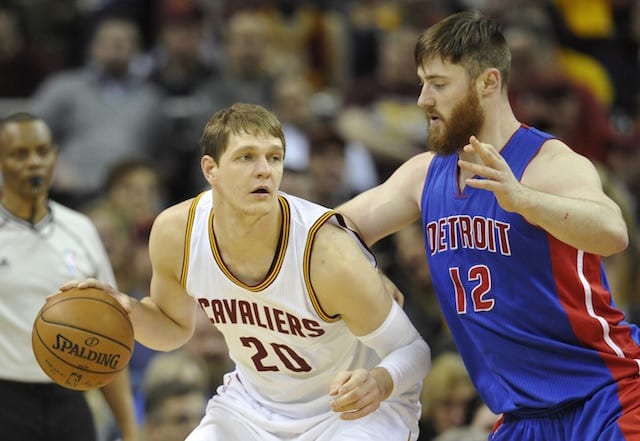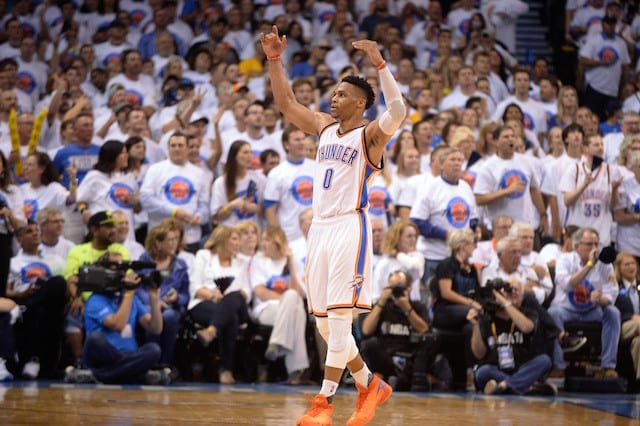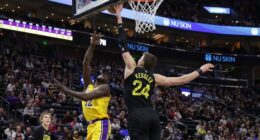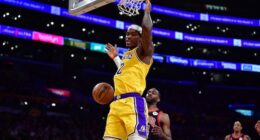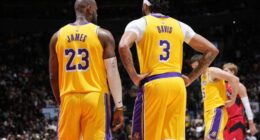It’s been a curious summer for the Los Angeles Lakers, one that saw them take steps forward both in terms of roster building and ideology. Luke Walton is back in town, and the organization appears ready to make an effort to modernize. Unfortunately, they also made some questionable decisions in free agency.
On the surface, the moves the Lakers made are head scratchers, but looking at the big picture we can understand why they took the path that they did.
For the past few years, the Lakers’ free agent strategy has been to open the Buss family vault for star players but practice frugality with everyone else. When they struck out, they would simply take their cap space and used it on one-year deals so they could chase the White Whale again next year. It’s a star-driven league, and the Lakers badly needed another one.
With Kobe Bryant on his way out, the Lakers had to have someone to pass the torch to. They were choosy to a fault, but it’s somewhat understandable given the pain they suffered to get their cap space.
In the span of a year, the Lakers lost two of the top big men of the past decade in Pau Gasol and Dwight Howard to free agency. In short order, one of the league’s glamor franchises became a cautionary tale about the dangers of allowing talented players to hit the market (something Oklahoma City now knows all too well).
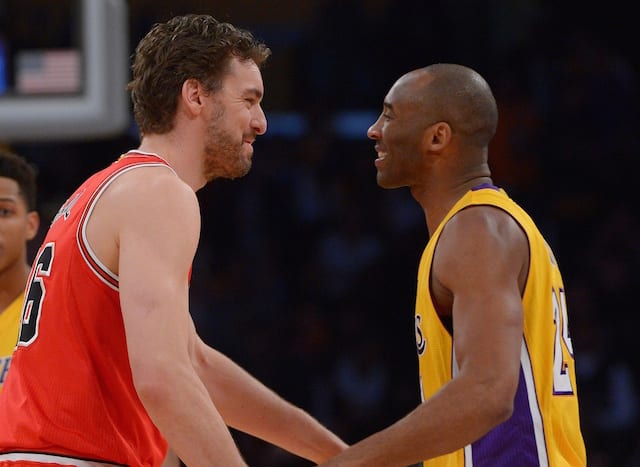
Thanks to the Collective Bargaining Agreement making sign-and-trades much more difficult, the Lakers received only cap space as consolation for watching Gasol and Howard take their talents elsewhere. The NBA had intended to give players less incentive to leave by all but eliminating sign-and-trades, but the perhaps unintended consequence was that they also left teams with nothing to show for stars who were determined to leave.
So there stood the once-mighty Lakers, wounded and vulnerable. Bryant was on his last legs, Gasol and Howard fled, and future draft picks were relatively scarce thanks to a few short-sighted trades. If the Lakers were going to improve quickly, they would have to put most of their eggs (cooling or otherwise) in the free agency, where they would attempt to lure the best of the best to sunny So Cal.
As such, the Lakers’ precious ledger wasn’t going to be weighed down by the salaries of non-stars. The cap space they never wanted was now their lifeline to return from the brink. They needed a new torch-bearer, and so the Lakers hoped to bring one in by emphasizing their glorious past and the lifestyle that Los Angeles brings.
Unfortunately, the stars weren’t interested in coming to Hollywood, at least not without a real chance to win right away. The Lakers were essentially stuck in free agency purgatory each summer, waiting for the aforementioned whales to turn them down while less talented, but more attainable players were scooped up by opportunistic franchises.
When the Omega-level powers invariably said no, Los Angeles refused to offer up long-term commitments to mid-tier players, instead opting to sift through the bargain bin for journeymen willing to take one-year deals so they could continue to swing for the fences.
The Lakers deviated from this strategy only twice, giving a four-year deal to Nick Young (oops) and a three-year deal to Lou Williams.
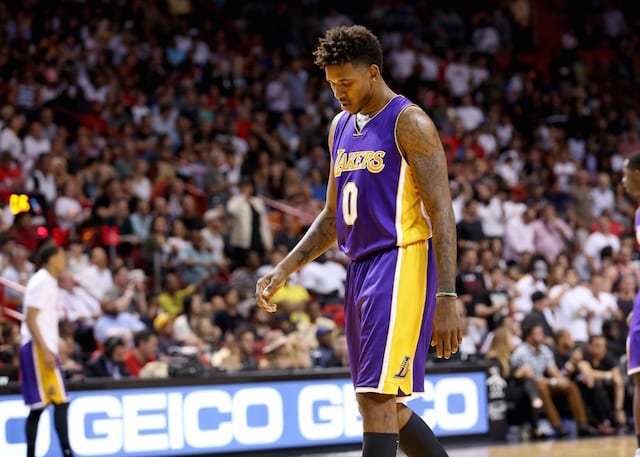
This summer, after years of striking out, and with Bryant retired, it was time for a change. Before this summer’s free agency began the Lakers knew that they were out of the running for lone-superstar Kevin Durant, so they put the full-court press on high-level role players in positions of need instead.
On the surface, it appeared that this was the correct decision and that the Lakers had learned from past mistakes. With the already-established stars staying away from a rebuild in Los Angeles, the team’s future now depends on getting the most out of young players D’Angelo Russell, Julius Randle, Brandon Ingram, and Jordan Clarkson. Finding players who can help foster their growth and development is critical.
They struck quickly, agreeing to a deal with center Timofey Mozgov shortly after free agency began, and then set their sights on a small forward. After Nicolas Batum and Kent Bazemore both decided to stay with their incumbent teams, they went and successfully pursued forward Luol Deng, while also bringing back restricted free agent Jordan Clarkson on a new deal. Clarkson was a no-brainer, but the other two signings raised some eyebrows.
From a pure basketball perspective, Deng and Mozgov made a lot of sense. Both are professional, veteran talents who can help run Coach Luke Walton’s system without complaining about touches or recoiling at the thought of doing the dirty work. The young players will grow at a faster rate playing alongside them, and as such their salaries can be seen as something of an investment in the Lakers’ future.
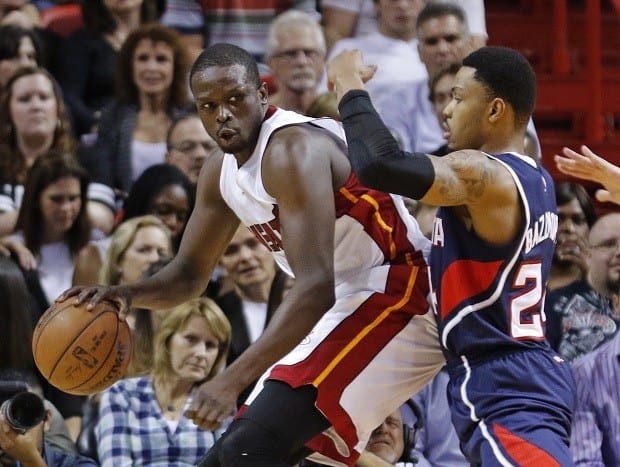
Unfortunately, the Lakers chose to give Deng and Mozgov, both over 30 and coming off down seasons, deals that last for four years, which is the maximum allowed. In terms of dollars, Deng eats up $72 million in cap space during that period while Mozgov gets $64 million. Based on factors like age and mileage, it’s unlikely that either will live up to their salaries in the final years of their deals. By that time Randle and Russell will both no longer be on cost-controlled rookie contracts, which means money could get tight.
Even worse, next summer, the Lakers should still have enough cap space for one max contract, but the Deng and Mozgov deals will almost certainly prevent them from being able to offer two. The Lakers spent years carefully preserving their cap space so they could be ready for the moment when multiple stars hit the market, so it’s a bit unsettling to see them let go of that dream so completely by giving four-year deals to veterans.
Again, Deng and Mozgov are great additions for what they bring to the team on and off the floor, but there comes a point where the size and the length of the contract outweigh the reward, and it feels like the Lakers landed on the wrong side of that line. If these were two-year contracts, they would look much better, but that’s not what the Lakers agreed to in their zeal to get a deal done after years of coming up short.
Ironically, it appears as though Los Angeles shifted their free agent strategy during the one summer when they shouldn’t have. The massive cap spike resulted in a feeding frenzy that saw huge contracts handed out Oprah-style, but those who were patient and frugal, as the Lakers were in previous seasons, found relative bargains.
Here is what Deng received compared to players with similar qualities:
Luol Deng (LAL): 4 years. $72 million
Arron Afflalo (SAC): 2 years, $25 million (Team Option for year 2)
Jared Dudley (PHX): 3 years. $30 million
Joe Johnson (UTA): 2 years, $22 million
Marvin Williams (CHA): 4 years, $54 million
And here is how Mozgov’s deal stacks up:
Timofey Mozgov (LAL): 4 years, $64 million
Festus Ezeli (POR): 2 years, $14.7 million (second year non-guaranteed)
Al Jefferson (IND): 3 years, $30 million
Tyler Zeller (BOS): 2 years, $16 million (Team Option for year 2)
Nene (HOU): 1 year, $2.9 million
One could argue that Mozgov and Deng are the best players and fits of their respective groups, but when contracts are taken into consideration things get a bit murkier. Down the line, it’s not unreasonable to assume that most of the players listed above will have more trade value than the Lakers pair due to the size of their contracts. The Lakers may very well intend to keep Deng and Mozgov long-term, but they know all too well how difficult long-term deals can be to trade if things go south.
The Lakers accomplished their goal of adding high-level veterans in positions of need, so in that sense, free agency was a success. However, the contracts they gave out may come back to bite them down the road.
